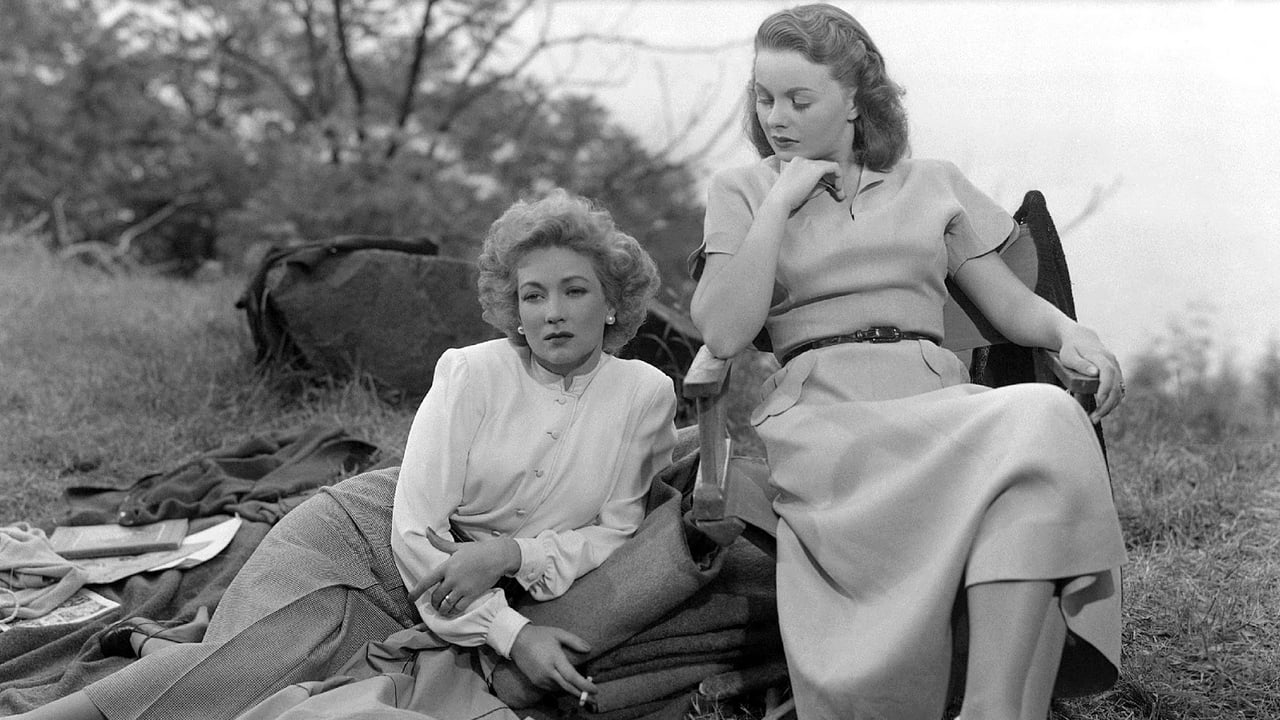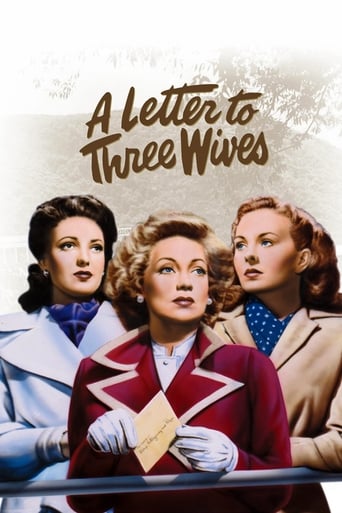

If you liked The Women, you'll love A Letter to Three Wives. It's funny, suspenseful, smart, and romantic. Three women, all friends and all married, are on a day-long boat ride when they receive a letter from their fourth girlfriend. She tells them she's run off with one of their husbands, but since they're stuck on the boat-and this is before the age of cell phones-no one can find out which husband it is until the end of the day!The wives are Linda Darnell, Jeanne Crain, and Ann Sothern, and the husbands are Kirk Douglas, Paul Douglas, and Jeffrey Lynn. Who will stray, and who will stay? You'll just have to watch this cute chick flick to find out. It's a great movie to watch with your girlfriends or sisters, or if you really want to torture your sweetie pie because he's done something wrong and owes you.
... View MoreNoir makes for not only powerful drama, but it can also be associated with satiric comedy. A very good example of this association is Joseph L. Mankiewicz's A Letter to Three Wives (1949), particularly in the Paul Douglas and Linda Darnell finale sequence. Kirk Douglas also plays a noir character, although his episode is much less guilt-charged and is lightened considerably by the not-coming-down-too-hard playing of Ann Sothern as the ambitious-for-Kirk wife. And Kirk does have an obvious, not-so-hard way out of his dilemma, whereas Paul Douglas and Linda Darnell are trapped in a situation not easily resolved. In fact, Paul has a job and a half as he endeavors to make the resolution convincing. That he succeeds so brilliantly is a measure of a really fine actor! (The Fox DVD rates 10/10 in my book).
... View MoreThis movie continues to show how well women characters were written for and portrayed. The women portrayed here are independent characters that hold well-rounded lives. They are able to handle home and business which is what life was like after WWII. They show their fears and worries but with strength. The women stand beside the man not a few feet behind and vice versa. Compare the man to woman relationship of these three main couples to the portrayals of the radio sponsor couple-the Manleys. It seems that women characters were stronger when "we did not have equal rights" than now. Fully clothed, little violence, no foul language. The movie "The Women" also had very strong female characters and again look when the movie was made. Addie was a great person and friend - better than these 3 women realized - she fixed it so the women would see that they've been taking their husbands for granted. Wonder if we could ever see a movie entitled " A Letter to three Husbands" that was as sophisticated and mature? The women all looked to the phone booth upon reading the letter. Could we ever have this kind of worry today that resulted in this great story with cell phones, wi-fi, texting, facebook, twitter, gps phone tracking, etc. Nope to each query.
... View MoreJoseph L. Mankiewicz' beautifully directed, and wittily written, tale of post-1940s America begins with "A Letter to Three Wives": "Dearest Debby, Lora Mae, and Rita ~ As you know, by now, you'll have to carry on without me from here. It isn't easy to leave a town like our town, to tear myself away from you three dear, dear friends who have meant so much to me. And so, I consider myself extremely lucky to be able to take with me a sort of memento, something to remind me always of the town that was my home. And, of my three very dearest friends, whom I want never to forget. And, I won't. You see - girls - I've run off with one of your husbands. ~ Addie" The three troubled wives are: World War II veteran "W.A.V.E" Jeanne Crain (as Deborah Bishop), beautiful gold-digging Linda Darnell (as Lora Mae Hollingsway), and radio career "gal" Ann Sothern (as Rita Phipps). Fetching narrator Celeste Holm (as Addie Ross) professes to have absconded with one of her three "dearest" friends' husbands: Is it charming schoolteacher Kirk Douglas (as George Phipps), rich and forceful Paul Douglas (as Porter Hollingsway), or young and worldly Jeffrey Lynn (as Bradford Bishop)? Under Mankiewicz' expert direction, the wedded six perform very well. The couples have, arguably, less "chemistry" than you might expect; however, this helps suspend disbelief regarding the film's plot.At times, the unrelated Douglas actors (Paul and Kirk) seem to be the "voice" of Mankiewicz; and, their parts are expertly performed. The women are all terrific. The three lead actresses receive fantastic support from Connie Gilchrist (as Ruby Finney), Florence Bates (as Mrs. Manleigh), and Thelma Ritter (as Sadie Dugan). Ms. Ritter, in an early role, was not credited; but, her role is substantial. And, it was nice to see Mae Marsh in a small role. Unfortunately, the film's eagerly anticipated ending is a little weak.******** A Letter to Three Wives (1/20/49) Joseph L. Mankiewicz ~ Jeanne Crain, Linda Darnell, Ann Sothern, Kirk Douglas
... View More